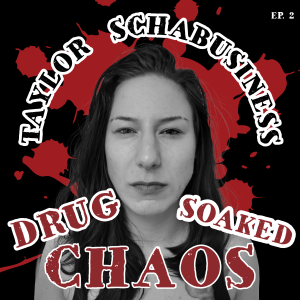Controversial Crimes TV - Podcast
Controversial Crimes TV - Podcast dives deep into the lesser-known, solved criminal cases that still leave more questions than answers. Each episode explores chilling stories, unsettling details, and mysterious twists that continue to haunt the public’s mind. From puzzling evidence to eerie conclusions, we uncover the dark corners of these real-life cases, leaving you to wonder: did justice truly prevail, or is something still amiss? Join us for a thought-provoking journey into the world of unresolved truths.
Episodes

Friday Apr 04, 2025
Friday Apr 04, 2025
In November 1997, a shocking crime unfolded in Saanich, British Columbia, that would ripple across Canada and beyond. Reena Virk, a 14-year-old girl of Indo-Canadian descent, was lured to a gathering under the Craigflower Bridge by peers she hoped were her friends. What began as a typical teenage hangout turned into a nightmare of violence that ended with her brutal murder. Reena, born to an immigrant father from India and a mother from a Jehovah’s Witness family, had always struggled to fit in. Her weight, her South Asian heritage, and her family’s unconventional faith made her a target for relentless bullying at school and in her community.
That fateful night, Reena joined a group of teens behind Shoreline Community Middle School. After police dispersed the crowd, the group moved under the bridge. There, the situation escalated when Nicole Cook, a girl from Reena’s group home, accused her of spreading rumors and stubbed a cigarette out on her forehead. This sparked a vicious swarm attack by seven girls and one boy, all aged 14 to 16. They punched, kicked, and beat Reena as she lay defenseless, crying out apologies. Most of the group left her battered on the ground, but Reena managed to stagger away—only to be pursued by two of her attackers: 15-year-old Kelly Ellard and 16-year-old Warren Glowatski.
What happened next was chilling. Kelly and Warren caught up to Reena, beat her again, smashed her head against a tree until she lost consciousness, and dragged her into the Gorge Waterway. Kelly held Reena’s head underwater until she drowned. Eight days later, on November 22, birdwatchers found her body in Portage Inlet. The discovery sent shockwaves through Saanich and ignited a national conversation about youth violence, bullying, and racism. Reena’s parents, Manjit and Suman Virk, were devastated, initially thinking she’d run away—a pattern from her troubled past.
The investigation quickly unraveled the group’s involvement. Six girls faced youth court for assault, receiving sentences from conditional terms to a year in jail. But Kelly and Warren were tried as adults for murder due to the crime’s severity. Warren, a troubled teen abandoned by his alcoholic parents, confessed his role and was convicted of second-degree murder in 1999, sentenced to life with parole eligibility after seven years. Kelly’s path was more convoluted—three trials over a decade, marked by denials and mistrials, until the Supreme Court of Canada upheld her second-degree murder conviction in 2009. She, too, got life with a seven-year parole window.
The case exposed ugly truths: racial tensions, the ferocity of teen cliques, and the failure of bystanders to intervene. Reena’s parents turned their grief into action, campaigning against bullying and inspiring initiatives like Pink Shirt Day. Warren later sought redemption, meeting the Virks to apologize and earning full parole in 2010. Kelly, now Kerry Sim, remained defiant for years but was granted day parole in 2017, raising kids while under strict conditions—though breaches, like drug use and domestic issues, have repeatedly jeopardized her freedom.
This tragedy, immortalized in Rebecca Godfrey’s book *Under the Bridge* and a Hulu series, remains a haunting chapter in Canada’s story. It’s a tale of a girl who just wanted to belong, undone by cruelty, and a community forced to confront its shadows.

Thursday Mar 13, 2025
Thursday Mar 13, 2025
The Crime:
In February 2022, 24-year-old Taylor Schabusiness killed Shad Thyrion, also 24, in Green Bay, Wisconsin. The crime happened in the basement of Thyrion’s mother’s home during a drug-fueled encounter involving methamphetamine and Trazodone. Schabusiness strangled Thyrion with a chain during sex, claiming she “went crazy” and kept going even as he coughed up blood. After his death, she admitted to sexually assaulting his corpse, then dismembering it with kitchen knives over several hours. She scattered his body parts—his head was found in a bucket by his mother, Tara Pakanich, while other pieces, like his torso and organs, turned up in bags, boxes, and her minivan.
The Interrogation:
The interrogation was grimly revealing. Schabusiness confessed to detectives with a mix of detachment and odd amusement, saying she enjoyed choking him and laughing about the mess she left. She told police they’d “have fun” finding all the organs, showing no real remorse. Her statements were detailed—she described using a bread knife for the decapitation and admitted she planned to take the parts but “got lazy.” Despite claiming a blackout, her recall was sharp, and detectives noted her calm demeanor didn’t match someone too impaired to understand her actions.
The Courtroom:
The court case unfolded over 2023. Schabusiness faced charges of first-degree intentional homicide, third-degree sexual assault, and mutilating a corpse. She pleaded not guilty, including by reason of mental disease or defect, but the insanity defense didn’t hold. Her trial was chaotic—she attacked her first attorney, Quinn Jolly, in court, leading to his replacement by Christopher Froelich. Competency hearings delayed things, but she was ruled fit to stand trial. In July, a jury convicted her on all counts after less than an hour of deliberation, rejecting her mental health claims—experts said drugs, not a disorder, drove her actions. On September 26, Judge Thomas Walsh sentenced her to life without parole, calling the crime an offense to “human decency.” She’s now at Taycheedah Correctional Institution, with an appeal reportedly in the works as of mid-2024, though her attorney has since said there’s little ground for it.

Saturday Feb 22, 2025
Saturday Feb 22, 2025
The Todd Willingham case involves the tragic death of Willingham’s three young children in a house fire in 1991. He was convicted of arson and murder based on evidence that was later questioned. The case has sparked intense controversy, especially surrounding whether Willingham was actually guilty of starting the fire.
In the aftermath of the fire, investigators initially believed the blaze was intentionally set, primarily relying on questionable fire science. They pointed to patterns in the burn damage, which were later discredited by advancements in fire analysis. Experts in fire science and forensic investigation later argued that the fire could have been accidental, casting doubt on the initial findings.
Willingham’s conviction was based on testimony from fire experts who relied on outdated methods, and much of the evidence used to convict him has been criticized. There were no physical signs that Willingham had any motive to harm his children, and some suggested that a faulty electrical wiring or other causes may have triggered the fire.
In 2004, a report by an independent expert, Dr. Craig Beyler, concluded that the fire was not arson and that Willingham’s conviction was a miscarriage of justice. Beyler’s findings, along with the emerging understanding of fire science, prompted many to question whether Willingham had been wrongfully convicted. Despite this, some people still hold the belief that Willingham may have intentionally set the fire, citing his behavior after the incident and a lack of concrete evidence to fully exonerate him.
The controversy surrounding the case raises broader questions about the reliability of forensic evidence in criminal investigations and the potential for wrongful convictions. The Todd Willingham case remains a deeply debated and tragic chapter in the American criminal justice system, with no clear consensus on his guilt or innocence.




